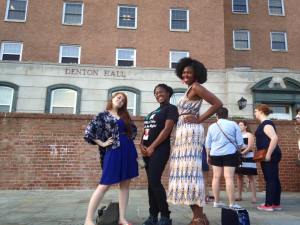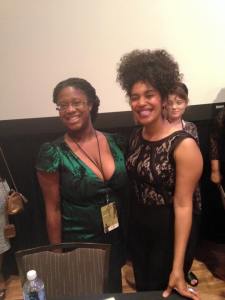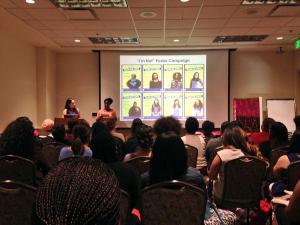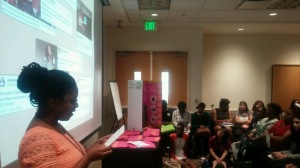On May 27th-30th, I went to University of Maryland, College Park for the National Conference for College Women Student Leaders (NCCWSL) to present the semester long Campus Action Project (CAP) Women of Color Coalition’s Telling Our Stories in a Workshop dedicated to combating women of color stereotypes. I, one of CAP team members, along with Megan, the advisor of the CAP, had fifteen minutes to talk about the semester long project and how our project addressed the stereotypes women of color are associated with and just importantly how they can reject it in favor for more nuanced stories and counter-narratives.Before I get to the presentation, I would like to talk about overall conference and its inner workings. These include the workshops, the keynote speakers, and the feminist camaraderie.
NCCWSL, sponsored by American Association for University Women (AAUW) and National Association of Student Personnel Administrators (NASPA), is a three day excursion that takes you from workshop to workshop, keynote speakers, and moments to network throughout the day. I came to UMD on Wednesday, May 27 at around 8:30pm, settled in, tried to plan my few days at NCCWSL, and then fell asleep at around 12am. On Thursday, I woke up at around 8am got ready for the $tart $mart salary negotiation workshop. While getting ready, I met my roommate for the conference, Shauna, who just graduated from a university in Iowa. She and her advisors drove from Iowa to be at NCCWSL and present a workshop on their CAP project which was one big event involving women in male dominated fields. I liked the $mart $tart workshop (which are also offered, here at UMBC once a semester!) because it gave me the tools to know my worth going into a job and the confidence to argue for that worth. But still at the end of the workshop, I was still struggling with the idea of negotiating my salary but the leaders of the workshop were really helpful in reassure me about its merits. Then I went to the Finding your Voice and Sharing Voice workshops which helped me and other conference goers hone in our voices and share them around us. I loved the speed networking workshop because I feel like I have a handle on networking but I need to pickup the pace with it while meeting other women.Then I went to the Women of Distinction Awards ceremony and I enjoyed the diversity of the people being recognized for their work in opening more doors for women to make more successful strides. I got a picture with Elizabeth Acevedo and Amanda Simpson and thanked them for their words of wisdom and hope.
The next day began with an empowering breakfast with fellow college women leaders and the sounds of the women drummers from the Bele Bele Rhythm Collective and then a great keynote by Maysoon Zayid, an actress, comedienne, and writer. If you have no idea who Zayid is, here is her Ted talk about having cerebral palsy and acting. She said some amazing and moving things about the leadership and inclusivity not only among gender and race but also ability. I felt like it was great bringing ability into context of activism and leadership because not everyone can go to protests and do physical action related things when it comes to activism. I really loved that addition to the line up as something to consider when leading a group. I transitioned from Zayid’s keynote to the From Silence to Self-Authorship: Storytelling for Empowerment workshop where talked about reading stories as children and what was missing from them. As expected, we talked about women’s stories as well as women of color stories are completely missing from young children’s stories and trying to find ways to start including those narratives in our present world. It was nice to see other people notice what I was noticing throughout my childhood. Then I went to the Career Fair and Dismantling Double Standard: Combating Gender Stereotypes on Campus which focused on other universities CAP Presentations related to about rape culture, domestic abuse, and racial discrimination. What I took from most of the workshop was shedding light on the different people effected by the double standard and how we can support them and create an area for people to share. After that workshop, my workshop group Addressing Stereotypes of Women of Color through a Gendered lens was up next!
Throughout the bustle of the conference, I managed to review my slides and major points that I wanted my audience to take away from the presentation. I was still very nervous but as soon as I got up and fumbled through my introduction I was ready! We asked about stereotypes and microaggressions that the audience hears on a regular basis. Each answer to the question was well received with snaps, claps, and nods in solidarity with their replies. We talked about the idea we developed from Women of Color Coalition discussions and interests. The we discussed the photo campaign and its reception (34,000+ notes on Tumblr :-D). We discussed the people we utilized to embody the message of storytelling, from national speakers, Franchesca Ramsey keynote lecture for Critical Social Justice Week and Shit White Girls Say to Black Girls fame, to community artists QueenEarth and Hollywood Infinite who are singers, songwriters, and spoken word artists, to institutional scholars, Professor Kimberly Moffitt discussing the politics of woman of color hair.We then shared the experience of the showcase which was the culminating event. We ended by telling our own stories of how the project impacted our thinking about having a discussion of racism through creative means like this project. I told the story about a white guy saw my poster which said, “My name is Bree and I’m not white on the inside.” He bristled then asked me if it was offensive to make a comment about someone being “white on the inside” and replied with yes and an explanation about agency and how you are actively telling your black friend a story about himself that he probably does not identify with. He looked at me with disbelief and then said that no one explained to him why things like this was offensive. He thanked me for widening his perceptions and giving him something to think about. I left with the knowledge of engaging with people that I would have otherwise thought they won’t understand the politics behind identity. The audience loved my story about my interaction with the white presenting guy. We got some questions and applause for our work. I felt a deep connection with this particular group and their willingness to hear our project and its inner workings. I will take that with me throughout my life knowing that the work that I do is important, the critical racial lens I bring to discussion, and have confidence in those two things.
Throughout the planning and after presenting this particular project, I developed deep pride for the project and I hope to carry the spirit of Telling Our Stories alive beyond just this spring semester. I was genuinely shocked that it was so well received and that people were talking about it every where I was at the conference and some of the AAUW interns were buzzing about it. They even wrote a blog post about our presentation and how amazing it was to here about the way that we had to present. Getting to talk to other college women student leaders about their struggles and triumphs was really relieving. Seeing women of color in student affairs and doing other things besides being a bell hooks, Patricia Hill Collins, or Kimberly Crenshaw was really awe-inspiring because it shows me that I can do the important social justice work I was born to do and work up to the black feminist philosophy. Overall, I felt pretty welcomed in the conference, not only in physical presence, but also in suggesting ideas and talking to different people about general things that I am doing and in life. I didn’t have to preface things about the social justice work I do because the other attendees are doing the same work I am doing. It felt pretty intersectional from the keynote speakers to the workshops to the college women student leaders I talked with. This experience helped me in so many different ways I am glad I had the opportunity to represent the Women Center through the Women of Coalition. As I left NCCWSL, I brought with me a confidence that was always with me and an eagerness to make a difference that gives me hope that I can make my aspirations come true.









